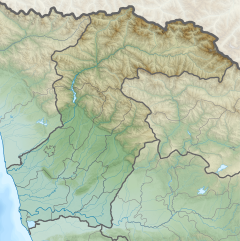Abasha (river)
| Abasha Abashistskali, Abashatskari | |
|---|---|
 The Abasha at the village of Gachedili | |
| Native name | აბაშა (Georgian) |
| Location | |
| Country | Georgia |
| Physical characteristics | |
| Source | |
| • coordinates | 42°32′54″N 42°30′16″E / 42.54833°N 42.50444°E |
| Mouth | Tekhuri |
• coordinates | 42°12′15″N 42°05′05″E / 42.20417°N 42.08472°E |
| Length | 66 km (41 mi) |
| Basin features | |
| Progression | Tekhuri→ Rioni→ Black Sea |
The Abasha (Georgian: აბაშა, Mingrelian: აბაშა), also known as the Abashistskali (Georgian: აბაშისწყალი) or Abashatskari (Mingrelian: აბაშაწყარი) is a river in western Georgia, running for 66 kilometres (41 mi) in the municipalities of Martvili and Abasha, Samegrelo-Zemo Svaneti region. Its catchment area is 370 square kilometres (140 sq mi).[1]
Geography
The Abasha river begins at the confluence of the mountain streams Rachkhitskali and Toba, near the village of Baldi, at 325 metres (1,066 ft) above sea level, and meets the Tekhuri as its left tributary.[1]
The Abasha forms a narrow canyon near the village of
Etymology and history
The legendary etymology of the
The Abasha traversed one of the principal districts of historical western Georgia. The important medieval church establishment of
See also
- River Abasha Waterfall Natural Monument
- Balda Canyon Natural Monument
- Gachedili Canyon Natural Monument
References
- ^ a b "აბაშა" [Abasha]. ქართული საბჭოთა ენცილოპედია [Georgian Soviet Encyclopedia] (in Georgian). Vol. 1. Tbilisi. 1975. p. 17.
{{cite encyclopedia}}: CS1 maint: location missing publisher (link) - ^ "Discovery of Paleontologists". Ilia State University. Retrieved 29 June 2013.
- ^ "New protected area in Martvili district". Rustavi2. 4 October 2010. Retrieved 29 June 2013.[permanent dead link]
- ISBN 0198263732.
- ^ ISSN 1512-2727. Retrieved 29 June 2013.


